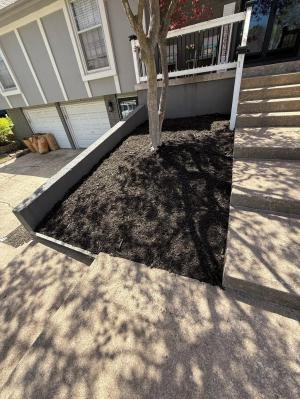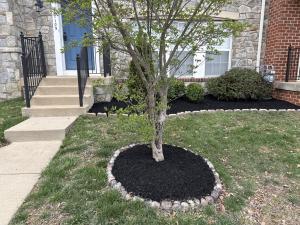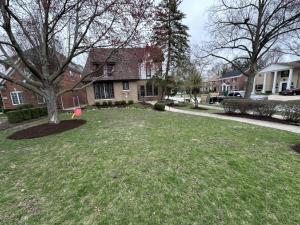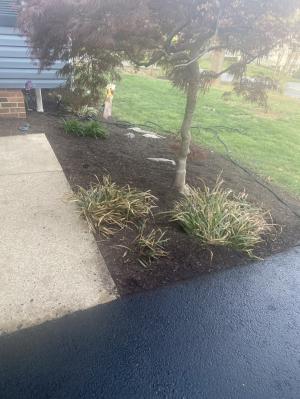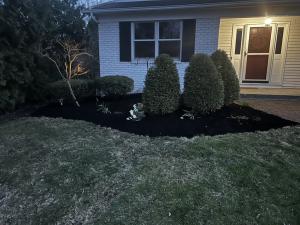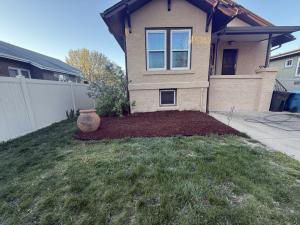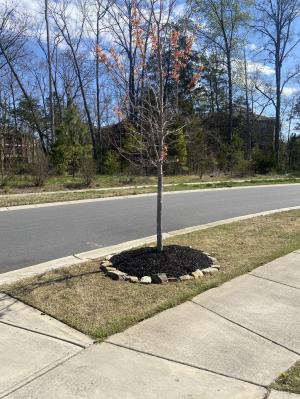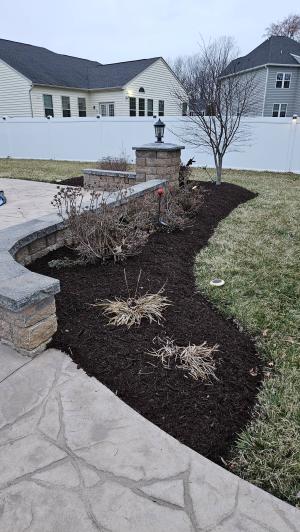How much is mulching?
On average, the cost of mulching is $200. Prices range from $45 to $75 on the low end and $500 to $750 on the high end.
Mulching prices:
|
National average cost |
$200 |
|
Typical cost range |
$100-$400 |
|
Low-end cost range |
$45-$75 |
|
High-end cost range |
$500-$750 |
Of all the factors that influence mulch costs, one of the most important is where you live and how much professionals are charging in your area. Whether you're landscaping your yard or planting a garden, get a better understanding of mulch costs by requesting cost estimates from mulching services near you.
What’s in this cost guide?
Some professionals may charge an hourly rate for their services. The average rate is $63 per hour. However, rates can be as low as $30 per hour — and as high as $120 per hour.
|
National average hourly rate |
$63/hour |
|
Typical hourly rate |
$50-$65/hour |
|
Low-end cost range |
$30-$40/hour |
|
High-end cost range |
$75-$120/hour |
Retailers sell bags (about 2 cubic feet) of mulch for $2 to $4. If you need less than 1 to 2 yards and don’t have a vehicle to transport it in bulk, it may make sense to buy bags of mulch. Bagged mulch is often made from high-quality bark and can be applied to small landscaping projects or gardens.
Several factors will affect the price of mulching your lawn, garden, flower beds or other landscaping. Here are some things to consider:
Type and color
The type of mulch you choose will have a large impact on your final price. Organic mulch consists of grass clippings, wood chips, leaves, cedar bark and other materials. Bark tends to be one of the most affordable options, as well as pine or wood shavings. In general, organic mulch is usually a great choice because it can benefit your soil.
Inorganic mulches are made from stones, plastic, rubber and brick chips, which tend to be more expensive than organic mulch. You can also buy mulch in different colors, but colored mulch is also typically more expensive.
Delivery
Operating a dump truck is expensive, so expect a truckload of mulch to cost more. The more cubic yards you order, the more this mulch delivery fee can be distributed over each cubic yard for a better overall deal. Look into local deliveries near you to see if they have lower prices than deliveries from a larger distributor.
Labor
The more workers and the greater amount of time needed, the higher the cost. If you need the crew to weed or perform curbing, expect the cost to reflect it.
Coverage
How much mulch you order is a product of how many square feet you need to cover. Many flower beds are complicated geometric shapes and can be difficult to estimate, but breaking it into smaller chunks can simplify the process. Note that 1 cubic yard covers about 108 square feet at 3 inches deep.
There are plenty of ways to cut down on mulch costs. For example, find ways to make it yourself. If you mow your own lawn and have a bag on the back of it, you can collect grass clippings and use it as mulch.
You can also mulch your leaves. Some lawn mowers are able to suck up autumn leaves and churn them into a fine texture, allowing you to use the resulting purée as mulch. Full leaves might choke the soil and cause mold to grow, so ensure that your leaves are properly chopped up. If you prefer to rake your leaves, save them and mulch them when you're done. You can also hire a leaf removal service that will mulch your leaves for you.
To lower your expenses, you may also want to consider preparing the area before the professional arrives. This can include weeding or removing other plants.
And, finally, ask for estimates from several mulch delivery services. By getting a few cost estimates, you can choose a service with a lower price. However, make sure you're not sacrificing quality, skills or experience by hiring a pro with extremely low prices.
Landscaping is hard work. Here are some of the considerations to take into account when considering doing it yourself vs. hiring a pro:
Time. Mulching is a commitment, and it takes plenty of time to complete. If you have a busy schedule and would need to sacrifice one or several weekends to get the project done, it’s probably worth having a pro do it instead.
It’s a messy process. Working with mulch can leave driveways stained, sidewalks dirty, and skin sticky and itchy. Hiring a pro can bypass all of these problems.
It can contain seeds. If you DIY your own mulch, you may wind up churning up a lot of seeds that then introduce weeds into your landscaping.
If you don't know how to add mulching to your yard, don't skip it — there are plenty of benefits you could be missing out on. For example, it can help prevent weeds from growing in your yard and garden. And here's a fun fact: Newspapers used as mulch can be effective in combating your weed problem, according to the U.S. Department of Agriculture. Just remember to get a weed specialist to remove them (or do it yourself) before adding the mulch.
Mulch can also protect your soil, as well as conserve and retain soil moisture. And organic mulch adds nutrients to your soil when it decomposes. Ultimately, your yard could see healthier, thriving plants and shrubs.
You can choose a mulching professional by searching for local businesses in your area. Compare these pros by reading their customer reviews and looking at their photos to see their quality of work.
And remember: Reach out to a few services and ask for free estimates. For more tips on how to hire a pro, visit Thumbtack’s Safety page.
Get your landscaping done exactly how you want it by hiring a qualified pro to do the job right. You’ll find the best mulching professionals by starting your search on Thumbtack.
Is it cheaper to buy mulch in bulk?
Yes, buying it in bulk is often cheaper than buying individual bags.
Should old mulch be removed?
Unless it's inorganic, old mulch should not be removed. You can leave it there to break down and contribute to the soil.
How many bags of mulch is a cubic yard?
One bag is typically 1 to 3 cubic feet. Because a cubic yard is 27 cubic feet, this means it would take 13 ½ bags of mulch to equal a cubic yard.
How often should you mulch?
Some homeowners do it every year, every couple of years or several times in one year. Talk to your gardener or landscaper to figure out the best frequency for your yard.
What's the difference between wood chips and mulch?
Wood chips are wood that has been run through a wood chipper, whereas mulch can be made of leaves, grass clippings, gravel and other materials.
